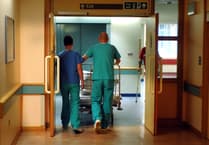Portsmouth Hospitals Trust will be on standby for an increased number of ambulance arrivals on January 1 – with figures showing a rise in traffic on the first day of recent years.
As ambulance delays and waiting lists have hit record levels in recent weeks, the NHS says demand for care means the public should use "use emergency services wisely" over the new year period.
Data from NHS England shows that January 1 is regularly a busy day for ambulance arrivals at Portsmouth Hospitals NHS Trust – this year, 156 patients arrived via ambulance, 22% more than the average for the prior fortnight.
The trend stretches back to before the pandemic – on January 1 2020, the last opening day of the year before coronavirus struck the UK, there was a 16% increase on the previous two weeks.
It reflects the picture across England, where 12,500 people arrived at hospitals in ambulances this January 1, up 5% on the fortnight before – before the pandemic, there was an 11% New Year's Day uplift.
Those needing emergency transport to hospitals this year will have additional complications to contend with, with ambulance delays hitting their highest levels on record across England.
After calling off a strike due to take place on December 28 so people could "enjoy Christmas without any additional anxiety", ambulance workers are due to strike across England on January 11 and 23.
The strikes will take place around similar action from nurses, who will strike on January 18 and 19, having already walked out for two days in December.
Figures show that across England between December 19 and 25, the most recent seven days for which figures were published, 19.9% of 70,000 arrivals were held in ambulances for an hour or longer. A further 17.5% were held for between 30 minutes and an hour.
During the same period last year, 3.4% were held for over an hour, and 9.7% for between 30 and 60 minutes.
The picture was the same at Portsmouth Hospitals Trust – where 29.1% of arrivals faced an hour's delay this year, up from 6.6% on the same dates a year ago. A further 18.9% faced a wait of half an hour or longer this year – last year, 4% did on those dates.
An NHS spokesman said: “The NHS has seen record demand for emergency care in recent months which is likely to continue through the new year period, so it’s important that the public use emergency services wisely.
“This means continuing to call 999 for life-threatening emergencies and using 111 online for other health needs where you will receive advice on the best next steps to take.”




